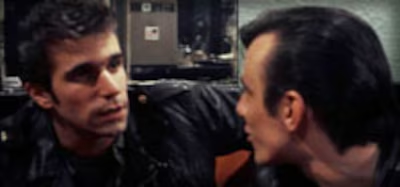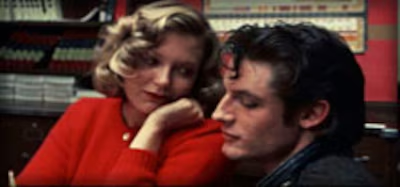The Lords of Flatbush
Brief Synopsis
Cast & Crew
Stephen Verona
Perry King
Sylvester Stallone
Henry Winkler
Paul Mace
Susan Blakely
Film Details
Technical Specs
Synopsis
The adventures of some high school boys who live in Brooklyn in 1957 and belong to a club they call "The Lords of Flatbush." Club activities consist of hot-wiring cards, playing pool, and drinking egg creams at the local candy store. Two of the Lords are having romantic problems; motorcycle-riding Chico likes Jane Bradshaw who wants nothing to do with him. And Stanley has gotten his girlfriend Frannie pregnant and now she wants to get married.
Videos
Movie Clip



Film Details
Technical Specs
Articles
The Lords of Flatbush
The Lords of Flatbush was written and directed by Martin Davidson and Stephen Verona (with additional screenplay work from Gayle Gleckler and additional dialogue from co-star Sylvester Stallone) and followed the goings-on of a gang of four high school friends, self-styled as The Lords of Flatbush. The movie's rambling story has Chico (Perry King) falling for the new girl, Jane (Susan Blakely), at his high school while dividing his time between her and his fellow Lords, Stanley (Stallone), Butchey (Henry Winkler) and Wimpy (Paul Mace). Meanwhile, Stanley gets his girlfriend pregnant and has to marry her, thrusting him into adulthood and away from his gang. Butchey and Wimpy both face uncertain futures as well and realize their days as the Lords of Flatbush are numbered.
The movie juggles several storylines, creating an oddly effective rambling style that seems to fit the lives of these aimless teens (though all the actors were in their mid to late twenties at the time). The dialogue almost sounds improvised on the spot and, in fact, many times it was. Sylvester Stallone, in particular, was allowed to write additional dialogue for his character and made suggestions for the rest. Sometimes the improvisation on camera resulted in fresh and unexpected reactions from the actors, producing a natural effect of real conversation that a lot of movies don't have. In one scene, in the jewelry store as Stanley looks at rings with his fiancé and her friend, he asks the jeweler (played by Martin Davidson, the writer and director) to see a ring cheaper than the one she's chosen. When he brings it over, Stanley asks him again about the original ring which clearly throws Davidson off as he stutters and asks, "Wait, this one?," not sure which ring Stanley is now referring to. Those odd cadences exist throughout the movie and create an effect of real people caught on film.
Released at a time when none of its stars had yet achieved fame, Henry Winkler was the closest to mainstream success. He was already co-starring in a hit ABC sitcom released in the wake of American Graffiti, Happy Days, but was not yet the huge star he would soon become as Arthur Fonzarelli, aka, The Fonz. Two years later, Sylvester Stallone would outdo them all with a movie he wrote and starred in, Rocky (1976), which would go on to win the Academy Award for Best Picture and Director as well as garner Stallone nominations for Best Actor and Screenplay. And it's star, Perry King, while never as big a star as Winkler or Stallone, would have his own success on TV with Riptide and other appearances in movies, such as the cult classic, Class of 1984 (1982). The only member of the gang to never achieve stardom was Paul Mace who would, in fact, make only one other movie, Sylvester Stallone's 1978, Paradise Alley. In 1983, at the age of 33, Mace was killed in an automobile accident.
In addition to the top billed male leads, another soon to be famous face can be glimpsed among the female stars, Susan Blakely. The Lords of Flatbush provided Blakely with a chance to show off her acting talents before The Towering Inferno (1974) put her face, already famous from modeling, before a much bigger audience. But like Stallone, 1976 became her big year as she was cast in one of the lead roles on television's Rich Man, Poor Man, a miniseries based on the bestseller by Irwin Shaw. The miniseries turned out to be a smash hit and soon, Susan Blakely, nominated for a Best Actress Emmy for the series, was everywhere. Within five years she would be playing Eva Braun to Anthony Hopkins' Adolph Hitler in television's The Bunker (1981).
The Lords of Flatbush never took off at the box-office like American Graffiti and even when it was re-released and shown repeatedly on cable to capitalize on its actors' newfound star status, it didn't make much of an impact. Still, it provided four young actors (Stallone, Winkler, King and Blakely) with a platform for future success and two other future stars, Armand Assante and Brooke Adams, have bit parts as a wedding guest and a high school student.
One interesting side note: Richard Gere was originally cast in the lead role of Chico but to say he and Stallone didn't get along was an understatement. The two actually came to blows at one point during filming and director Davidson, more invested in Stallone and his devotion to the characters and dialogue writing, fired Gere, replacing him with Perry King. Later, Gere would become a box-office giant, as would Stallone, but the two would never work together again.
Producer: Stephen Verona, Richard Millman (Associate Producer)
Director: Martin Davidson and Stephen Verona
Screenplay: Stephen Verona, Gayle Gleckler, Martin Davidson, Sylvester Stallone
Cinematography: Edward Lachman, Joseph Mangine
Art Direction: Glenda Ganis
Music: Joseph Brooks
Film Editor: Muffie Meyer, Stan Siegel Cast: Perry King (David 'Chico' Tyrell), Sylvester Stallone (Stanley Rosiello), Henry Winkler (Butchey Weinstein), Paul Mace (Wimpy Murgalo), Susan Blakely (Jane Bradshaw), Maria Smith (Frannie Malincanico), Renee Paris (Annie Yuckamanelli), Paul Jabara (Crazy Cohen), Bruce Reed (Mike Mambo), Frank Stiefel (Arnie Levine).
C-86m.
by Greg Ferrara
SOURCES:
Wikipedia
IMDB

The Lords of Flatbush
Quotes
Trivia
Sylvester Stallone stated that his payment for his role was 25 free t-shirts.
Sylvester Stallone was allowed to rewrite and improvise some of his character's dialogue.
Henry Winkler stated that when he was creating the character of the Fonz in "Happy Days" (1974), he based his performance on Sylvester Stallone's portrayal of Stanley.
When the film wrapped production, it took over a year to edit and score because the producers needed to secure additional financing.
Miscellaneous Notes
Released in United States 1974
Released in United States 1974














